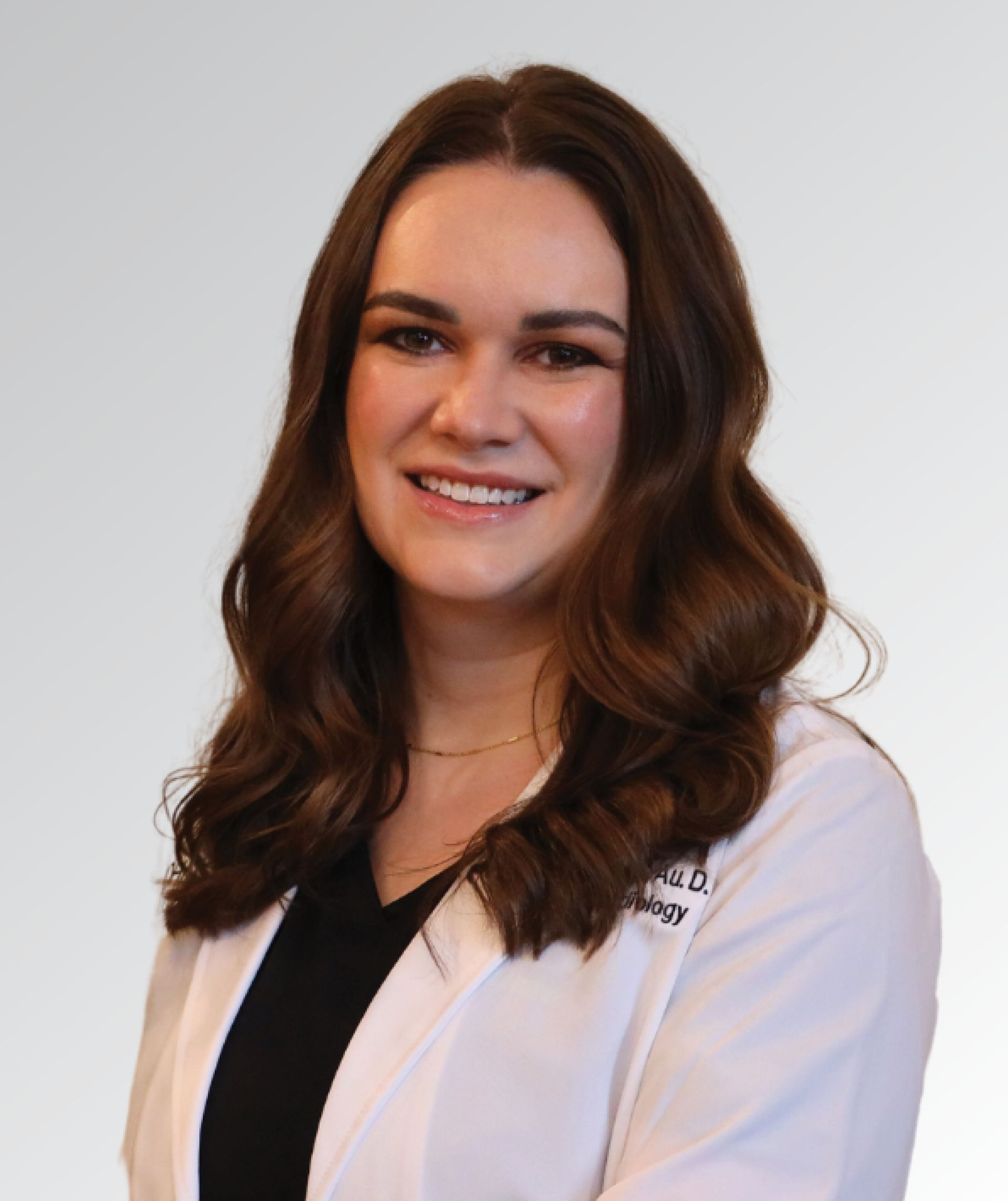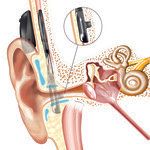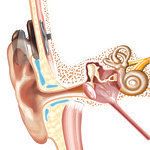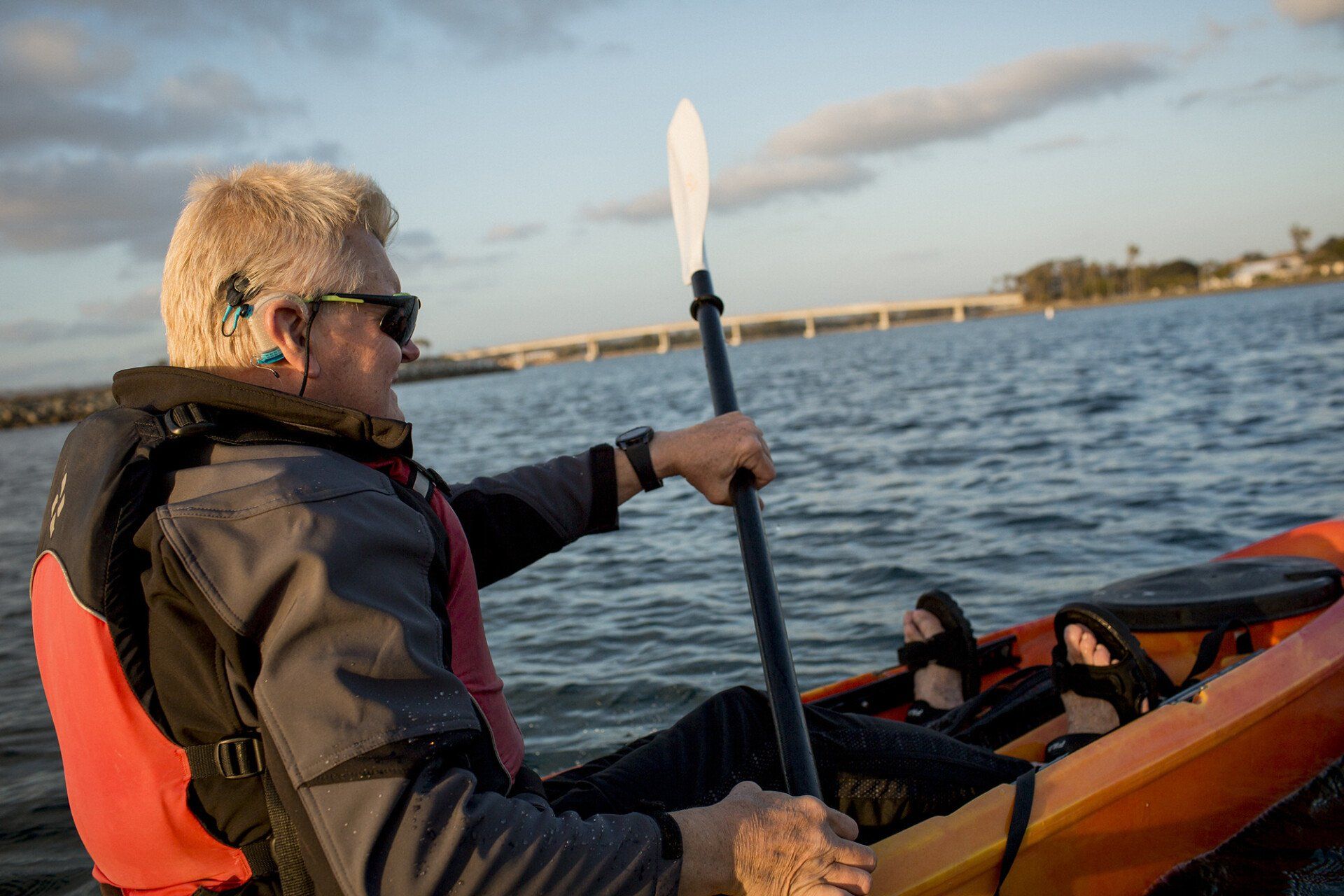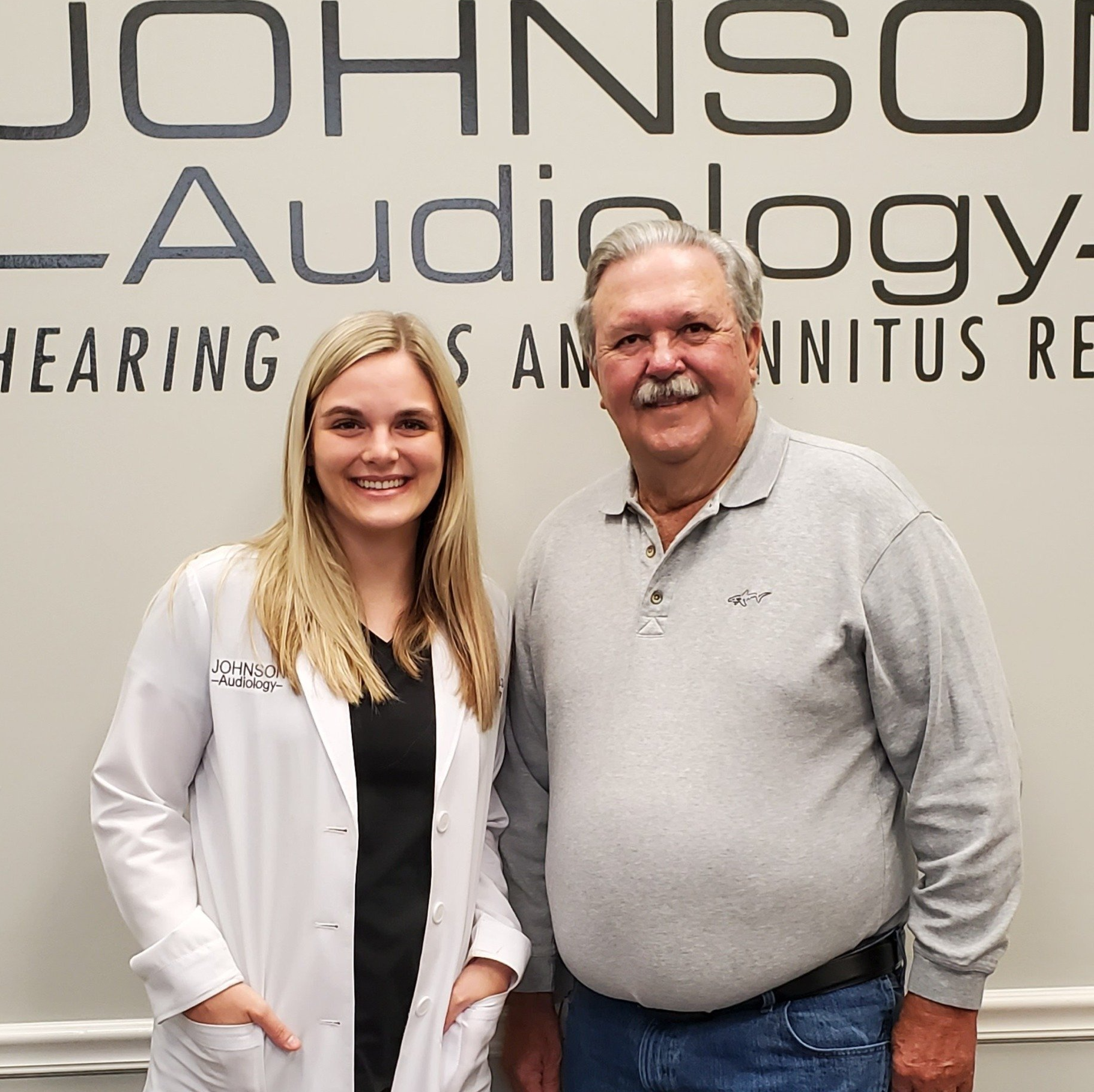Cochlear implants
What is a Cochlear Implant & Bone Conduction Implant?
Today’s sophisticated hearing aids are modern marvels of technology, restoring the world of sound to millions of people with hearing loss.
But for some with very profound hearing loss, hearing aids may not be enough by themselves. Additionally, for those with a malformation of the middle ear or of the ear canal, usually a condition present since birth, hearing aids are not an option. Do either of these describe you? If so, hearing implants such as a cochlear implant or a bone conduction implant, might be the answer!
Cochlear implants and bone conduction implants are devices implanted by an ENT surgeon. The devices are then programmed by a qualified audiologist. A cochlear implant bypasses the damaged hearing organ and stimulates the auditory nerve directly. A bone conduction implant bypasses issues present in the ear canal and/or the middle ear allowing for direct stimulation of the organ of hearing and auditory nerve.
While implants do not actively “cure” hearing loss, and sound with an implant is not exactly like sound for those with typical hearing, implants restore sound so that the listener can enjoy being part of the hearing world again.
Johnson Audiology’s Chattanooga, TN office is here to support patients for the initial implant candidacy appointment, referral to an implant surgeon and follow up care after implant surgery—from activation to ongoing long-term mapping and care.
MEET JOHNSON AUDIOLOGY'S
COCHLEAR IMPLANT PROGRAM DIRECTOR
Dr. Hannah Dearth specializes in cochlear implant candidacy evaluations and mapping. She says that it is a privilege to work with patients who are on the cochlear implant journey, guiding them from initial consultation to many years post-implantation. Dr. Dearth completed her Bachelor's degree in Communication Sciences and Disorder at West Virginia University and her Doctoral degree in Audiology also at West Virginia University. Dr. Dearth sees cochlear implant patients out of Johnson Audiology's Chattanooga, TN office.
COCHLEAR IMPLANT
A cochlear implant completely bypasses the hearing mechanisms of the ear and stimulates the auditory nerve directly via an electrode implanted in the inner ear. The implant compensates for the damaged part of the inner ear and provides stimulation to the auditory nerve which then transmits sound to the brain. Often, for patients with severe to profound hearing loss, hearing aids only provide more volume, not more clarity. A cochlear implant is considered when performance with hearing aids is very poor and bypassing the damaged area of the inner ear will more than likely lead to improved clarity of words.
WOULD A COCHLEAR IMPLANT OR BONE CONDUCTION IMPLANT CONSULTATION BE RIGHT FOR YOU?
If you answered YES to several of these question, then a consultation appointment to explore a cochlear or bone conduction implant is a good idea. Book a consultation appointment today in the Chattanooga, TN office of Johnson Audiology.
STEP 1
LEARN MORE AT THE CONSULTATION
The road to getting a hearing implant begins with a consultation with your audiologist at Johnson Audiology. This is the perfect time to ask questions, discuss your history with hearing loss and discuss your experience with hearing aids. You will also talk through the process of qualifying for implantation and obtaining insurance approval. Candidacy for implantation is not self-determined but rather is based on specific FDA labeled indications. Your audiologist will use that criteria for determining your candidacy.
STEP 2
LET’S TEST YOUR HEARING
The next step is to test your hearing. Your audiologist will do a comprehensive diagnostic, which includes measuring your hearing levels at various frequencies and evaluating how well you can decipher speech in quiet and background noise. The hearing test will be conducted with and without hearing aids to determine if you receive adequate benefit from hearing aids. If not, a cochlear implant might be a good option for you.
STEP 3
GETTING INSURANCE APPROVAL
Unlike hearing aids, most hearing implants are covered by Medicare if your aided hearing loss meets FDA and Medicare criteria. Implants are also covered by many private insurance companies and for some Medicaid beneficiaries. Contact your insurance company for more details. Your audiologist and the support staff at Johnson Audiology are also here to help you navigate the insurance approval process.
STEP 4
IT’S TIME FOR IMPLANTATION
Johnson Audiology will refer you to an Ear Nose and Throat (ENT) surgeon for the surgery. If you visit your ENT first, they will refer you to Johnson Audiology for the steps in the process that we administer. Receiving an implant is typically a straightforward outpatient procedure. It usually takes about two hours and is done under general anesthesia. A quick recovery is common, and most people are back to normal activities in a few days.
STEP 5
IT’S ACTIVATION DAY
Once your incision is healed, typically within 3-4 weeks, you will have an appointment with your audiologist at Johnson Audiology to activate your device. This is the day you will start to hear sound through the implant. Your audiologist will help you set realistic expectations for this day since every person’s activation is a unique experience. Your audiologist will program your device to levels that are appropriate for you. Over the next several months, you will work with your audiologist to fine-tune your device for optimal hearing.
STEP 6
GETTING THE MOST OUT OF YOUR IMPLANT
In the weeks and months after your implantation, your brain will be retraining itself to hear sounds that it may not have heard in years. Your audiologist will help you with this rehabilitation process, even providing you with listening exercises. Your audiologist also will help you set reasonable expectations as you move through the process and adjust to your new world of hearing. Your audiologist will continue to be with you as periodic appointments will be a part of your new lifelong journey to better hearing.
THINGS TO KNOW ABOUT HEARING IMPLANTS
Hearing implants can be life changing.
The process starts with a surgical procedure to place the actual implant.
The decision to get an implant is not self-determined but rather is based on specific FDA labeled indications.
Hearing with an Implant is a lifelong journey as follow-up and mapping appointments will be ongoing.
An implant is not the same as a hearing aid.
Hearing with an implant is not the same experience as typical hearing. Your audiologist will help you understand what to expect and how to manage expectations.
HEAR FROM IMPLANT RECIPIENTS AND FAMILIES
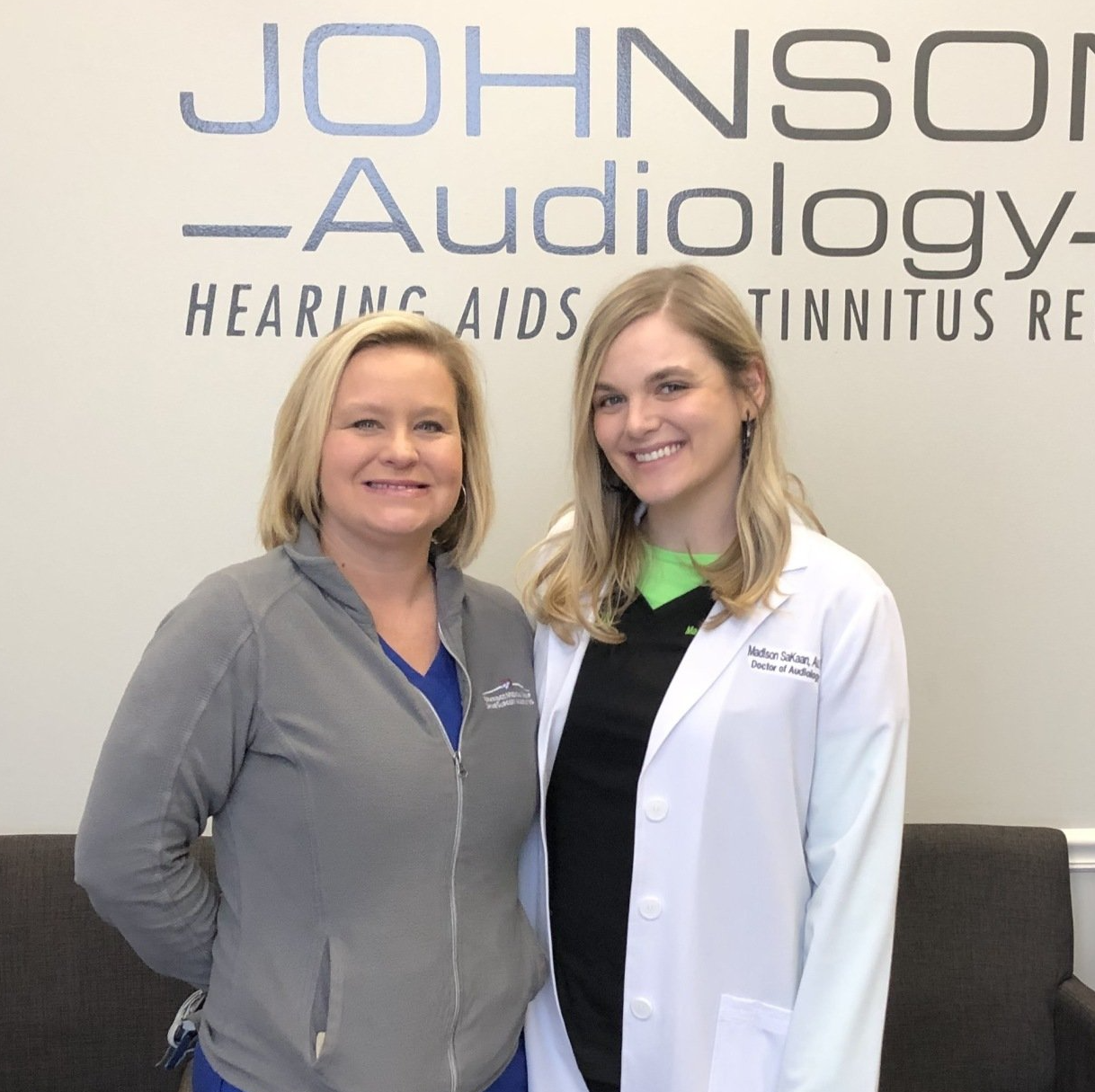
I was born without hearing in my right ear and have always had to adjust my position in any setting to ensure those speaking to me were on my left side. This has caused me to avoid social functions and caused anxiety in many areas of my everyday life. I did not know the technology existed to allow me to hear from both sides until I saw Dr. Johnson at Johnson Audiology and her amazing staff. She treated me like family and assisted me every step of the way. I underwent BAHA implant surgery in August 2019 and was fit with the processor a few months later. My life has changed completely as I no longer avoid social settings and can hear no matter where the sound is coming from in the room. I feel so blessed that God led me to Dr. Johnson and hope anyone with hearing difficulties would take a chance on themselves to see what can be done to improve their lives.
Andrea Griswold
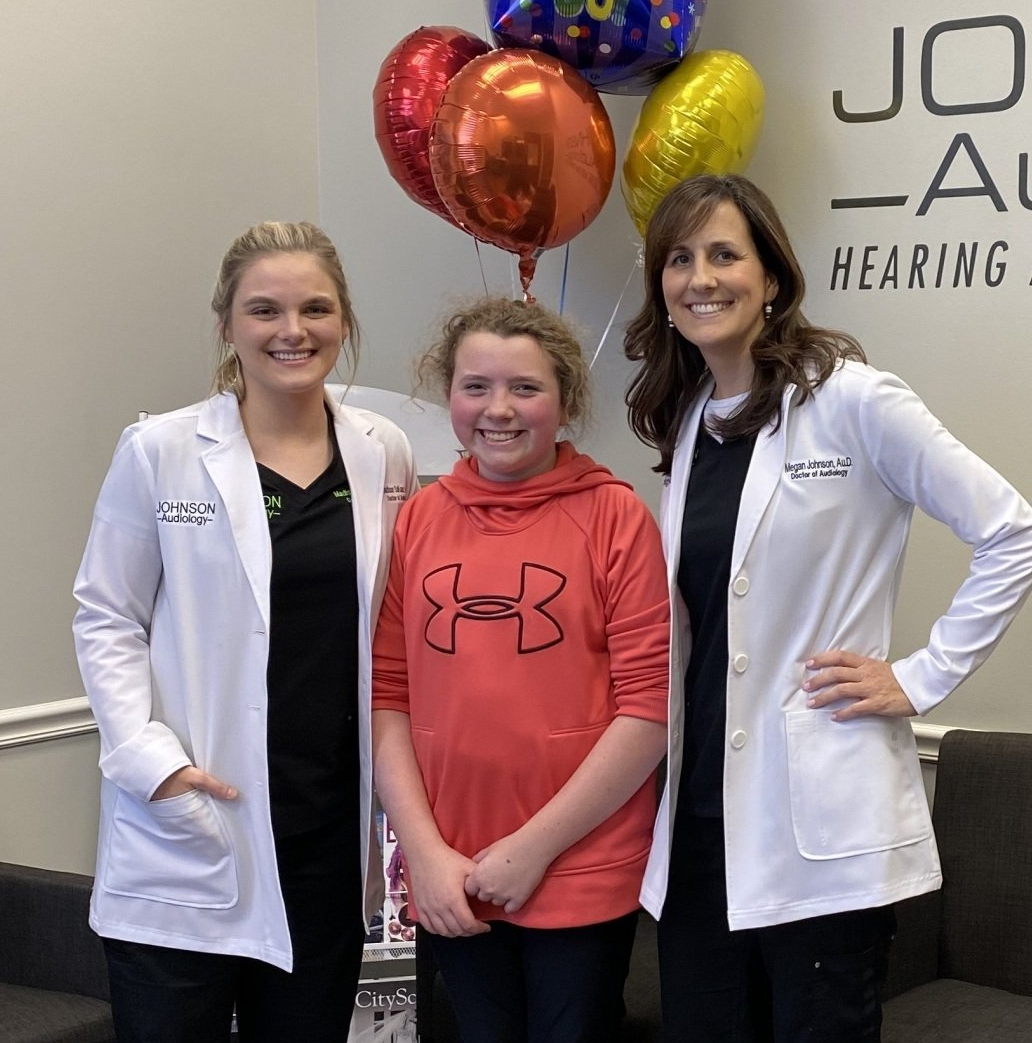
I would never be able to express how thankful I am that we found Johnson Audiology for my daughter Madalyn. After 12 years of uncertainty, I started looking on the internet for audiologists near me. I just wanted her hearing tested again and also someone to check her hearing aids. I scheduled an appointment with Dr. Sakaan at Johnson Audiology, and it is the best thing that has ever happened to us on this journey. We have been educated so much about Madalyn’s hearing loss. We started a new journey to better hearing by choosing a cochlear implant in February 2020. While it is a life changing process, I know that Johnson Audiology is there guiding us along the way. I also have to mention how wonderful everyone treats Madalyn. She LOVES going and seeing everyone. I am looking forward to each and every step we take to better hearing for Madalyn Reese!
Dawn Ownby
My journey started on May 5, 2020. I was very apprehensive about my cochlear implant surgery and wondered what life held with a cochlear implant. I first met Dr. Madison Sakaan when she did an evaluation of my hearing prior to my surgery. I was very nervous about the activation day for my implant's processor, but it was the beginning of an amazing journey. On June 5, my implant was activated, and my hearing life changed forever. I am hearing sounds I haven't heard for years, and now enjoy conversations again, even in a crowd. I can now talk on the phone again, watch television without the volume blowing everyone out of the room. Dr. Sakaan has now done mappings to improve my comprehension as I have become accustomed to the implant. Things have improved so much, it is really hard to describe. Thank you all so much for improving my quality of life.
Alan Hunt



